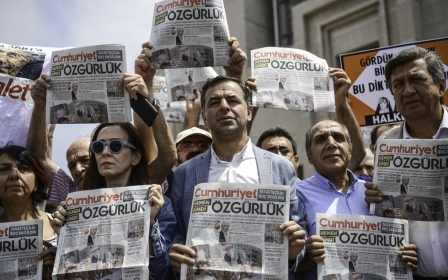Russian accused of IS 'drone attack' plot on US jet in Turkey

ISTANBUL, Turkey – A Russian man has faced court in Turkey accused of trying to carry out an Islamic State operation to destroy a US aircraft at the Incirlik base.
Renad Bakiev was arrested 13 days ago for allegedly carrying out reconnaissance near the airbase, in Adana province, the Turkish Dogan News Agency reported.
Local media reports say police had Bakiev under observation after intelligence provided by Turkey’s spy agency, the MIT.
Reports also stated that he was trying to raise money from other militants to buy a drone, which prosecutors claimed he was planning to fly into a US jet.
He was charged with attempting to "stage a bomb attack aiming to bring down a US plane using a drone", the reports said.
Bakiev was also planning to bomb an Alevi foundation alongside his drone attack on a US aircraft, media reports said.
The Alevi religion follows a different strain of Islam and is rejected by more fundamental Islamic groupings.
Bakiev was previously arrested when he crossed over from Syria into Turkey’s border province of Kilis, media reported.
He was charged with "membership in a terrorist organisation" and deported. However, the timing of his initial arrest was not disclosed.
A large number of nationals from Russia’s Muslim-populated regions, former Soviet republics in central Asia and China’s Xinjiang Uighur autonomous region are believed to have travelled to Syria to fight alongside various rebel groups, including those designated as terrorist such as IS and al-Qaeda affiliate, Jabhat Fateh al-Sham.
Last week Turkey’s foreign minister, Mevlut Cavusoglu, reassured his Chinese counterpart that Ankara would take strict measures against ethnic Uighurs if their actions posed a threat to the mutual security of China and Turkey.
There are growing fears that battle-hardened militants will leave Syria after the defeat of militant groups and return to their home countries, generating serious security risks.
Turkey has also been the victim of such attacks due to its long and porous border with Syria.
Abdulkadir Mashapirov, an Uzbek IS militant, was responsible for the last major attack on Turkish territory on New Year’s Eve. He killed 39 people ringing in the new year at an Istanbul nightclub.
Meanwhile, Bulent Tufenkci, Turkey’s customs and commerce minister, announced on Thursday that only restricted access was being permitted at the country’s Cilvegozu border gate with Syria.
Tufenkci cited the reason as the "occupation of the Bab al-Hawa border post on the Syrian side".
The umbrella group Hayet Tahrir al-Sham, dominated by the Jabhat Fateh al-Sham, has taken almost full control of Syria’s Idlib province, ousting former ally Ahrar al-Sham.
Separately, a Turkish national security meeting chaired by Prime Minister Binali Yildirim decided to shut down the Cilvegozu border gate and allow only humanitarian aid to pass if the US began bombing Idlib, the Turkish newspaper HaberTurk reported on Thursday.
US officials over the last fortnight have voiced serious concerns over the risks posed by al-Qaeda affiliates taking control of Idlib.
Remarks made last month by Brett McGurk, the US special envoy in the anti-IS coalition, on the al-Qaeda presence in Idlib were construed in Ankara as a veiled attack on Turkey.
McGurk had said Idlib had become an al-Qaeda safe haven and the US would talk to their Turkish partners to ensure border crossings were prevented.
The Turkish government allows the United States use of the Incirlik airbase. Incirlik is also being used for operations by the international anti-IS coalition.
New MEE newsletter: Jerusalem Dispatch
Sign up to get the latest insights and analysis on Israel-Palestine, alongside Turkey Unpacked and other MEE newsletters
Middle East Eye delivers independent and unrivalled coverage and analysis of the Middle East, North Africa and beyond. To learn more about republishing this content and the associated fees, please fill out this form. More about MEE can be found here.





